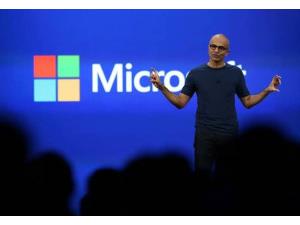Please use the sharing tools found via the share button at the top or side of articles. Copying articles to share with others is a breach of FT.com T&Cs and Copyright Policy. Email licensing@ft.com to buy additional rights. Subscribers may share up to 10 or 20 articles per month using the gift article service. More information can be found here.
https://www.ft.com/content/0e8c3002-20c7-11ea-92da-f0c92e957a96
Satya Nadella, chief executive officer of Microsoft, has earned a unique place among the tech barons who preside over today’s digital landscape. The growing wealth and power of Big Tech over the past decade has been a defining feature of modern capitalism. Yet even judged by the standards of most of his peers, Mr Nadella stands out. By the end of November, the total return generated for Microsoft shareholders during his near-six year tenure passed $1tn. Contrast that with the moment when he took over as only the third CEO in Microsoft’s history, and the software company looked like it might be on the fast track to technological irrelevance. This stunning exercise in wealth creation has occurred at a time when the purpose and power of large companies has come under more scrutiny than at any time in a century. The single-minded pursuit of shareholder value is in question, and politicians and regulators are showing a new appetite for challenging the dominant companies of the age — particularly in tech.
Please use the sharing tools found via the share button at the top or side of articles. Copying articles to share with others is a breach of FT.com T&Cs and Copyright Policy. Email licensing@ft.com to buy additional rights. Subscribers may share up to 10 or 20 articles per month using the gift article service. More information can be found here.
https://www.ft.com/content/0e8c3002-20c7-11ea-92da-f0c92e957a96
So it is notable that Mr Nadella has put Microsoft back at the top of the tech heap without attracting the resentment and anxiety provoked by some other tech leaders — or, for that matter, Microsoft’s own former self. The software company was once considered to be the model of the corporate bully, using its monopoly over PC software to hold sway over the tech world. The equanimity that has accompanied its recent rise is a testament to the new purpose at the heart of the company, as well as a corporate culture that reflects the personal qualities of a chief executive more given to humility than the intellectual arrogance the company was once known for. It is still far too early to judge the impact of the new Microsoft that Mr Nadella has been building. With control of one of the handful of cloud computing platforms that stand to dominate tech’s next phase, it is likely to wield significant influence over the future of business and society, whether for good or ill.
Please use the sharing tools found via the share button at the top or side of articles. Copying articles to share with others is a breach of FT.com T&Cs and Copyright Policy. Email licensing@ft.com to buy additional rights. Subscribers may share up to 10 or 20 articles per month using the gift article service. More information can be found here.
https://www.ft.com/content/0e8c3002-20c7-11ea-92da-f0c92e957a96
Mr Nadella himself is well aware of the risks, and claims to have set parameters for his company that will ensure that its impact on the world is benign. At a time when the reputation of the tech industry is moving in inverse proportion to its power, he is also keen to distance himself from the rest of the pack. “There is no such thing as Big Tech any more,” he declares, a reference to what he claims are key differences in business model between the leading tech companies that have put them on diverging paths. Proving that Microsoft has truly changed its ways and become a new type of tech giant will be the ultimate test. One mark of Mr Nadella’s success in 2019 has been how seldom his company has been in the headlines. With a focus on selling technology to businesses more than consumers, it operates largely behind the scenes, though it does reach consumers through the Bing search engine and email service, the Xbox games console and tailored versions of its PC software. There are still plenty of controversies to navigate, from the company’s tussles with the US government over access to personal data hosted on its servers, to the housing shortages and other growing pains caused by its expansion in the greater Seattle area. Early in the year, it set aside $500m to support more affordable housing in its home region, pre-empting similar moves by other Big Tech companies.


